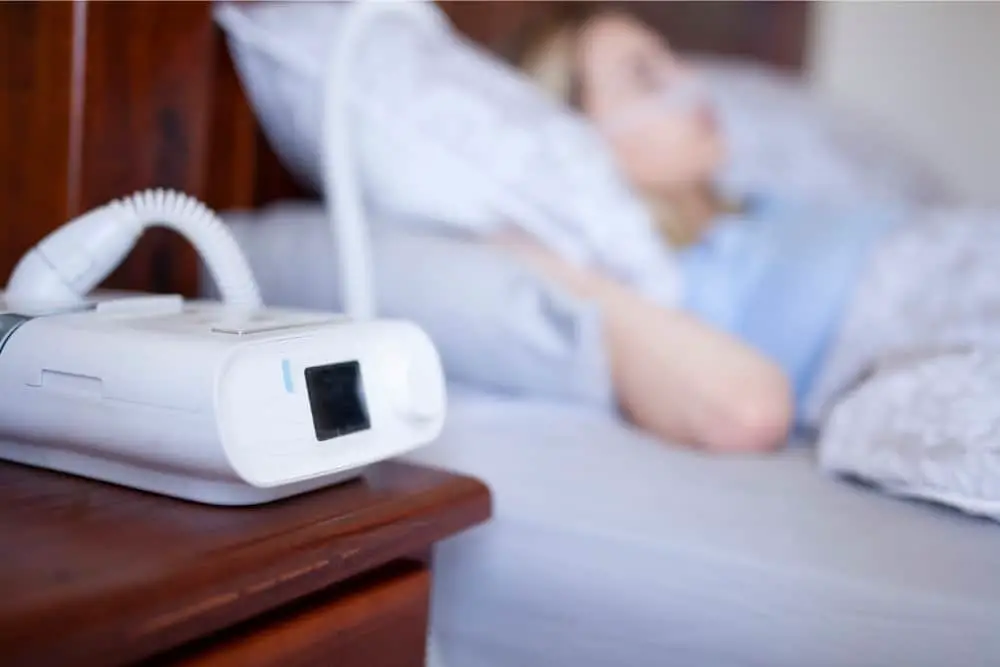A CPAP machine is an assistive machine that pumps oxygen through a mask when someone with sleep apnea is asleep. Therefore, it doesn’t know when you stop breathing.
A CPAP machine doesn’t work in the same way as a defibrillator, for example, which sends electrical shocks to the body when someone has stopped breathing.
A professional from a sleep clinic will set the pressure of the CPAP machine, after which you cannot change. This is because the air pressure is set to support your body when you sleep, so you are less likely to experience apneas.
Without a CPAP machine, those with sleep apnea can experience apneas (moments where you stop breathing) over 30 times an hour on average. A CPAP machine works to push air pressure through the airways that usually close or get blocked during apneas.
However, this doesn’t mean to say that people don’t stop breathing with a CPAP machine. Some people feel claustrophobic when they first wear the CPAP mask, or the air pressure might be set too high or too low.
In these instances, your body should naturally wake up in the same way that it wakes up during apneas. You should seek professional advice in the event of this, because a CPAP machine is designed to help you breathe, not to hinder your breathing.
In short, CPAP machines do not know when you stop breathing, because they are designed to maintain a steady level of breathing as you sleep. Instead, they work to keep you breathing by providing sufficient air pressure which prevents you from experiencing frequent apneas.
What does a CPAP machine do when you stop breathing?
As a CPAP machine is an assistive device, it will not be capable of preventing someone from dying from not breathing. Instead, this machine provides air pressure to keep the airways open when sleep apnea closes them.
During episodes of apnea, the airways become closed or blocked. This is what causes seconds or minutes of no breathing, snoring, or choking. These events are known as apneas and can occur up to or over 30 times per hour.
People with sleep apnea will have difficulty falling and staying asleep, and will experience exhaustion and fatigue throughout the day. If left untreated, sleep apnea can create complicated health issues.
A CPAP machine, or a Continuous Positive Airway Pressure machine, provides (you guessed it) continuous levels of air pressure via a mask. This mask can range from a nasal mask that goes over the nose, a nasal mask that goes under the nose, and a full mask that covers the mouth and nose. This air pressure works to keep the airways open to prevent blockages, which stops apneas from happening.
For the CPAP machine to be successful, some trial and error will have to occur. The mask needs to be sealed properly so the air pressure is consistent and constant, and users will have to develop new sleeping habits such as lying on their backs so they are comfortable with the mask on.
However, some advanced CPAP machines come with extra features that record your breathing pattern. If you begin to have apnea with your CPAP machine - which is usually caused by a problem such as a loose mask that leaks the air pressure - your machine may cause an alarm to wake you up after several minutes of apnea.
Can a CPAP machine tell if you’re asleep?
No, CPAP machines cannot tell if you’re asleep. These are assistive devices that work to provide a constant stream of air pressure to keep the user’s airways from closing or blocking.
CPAP machines, also known as Continuous Positive Air Pressure machines, provide a continuous flow of air once the mask has been put on.
The air pressure is set by a professional at the sleep clinic where the individual will be tested for sleep apnea. This air pressure cannot be changed. Once the mask and machine are on, the air pressure begins and stays continuous before and during your sleep cycle until you take the mask off.
Sometimes, CPAP machines may come with a ramp feature. This feature helps the individual to adjust to the air pressure by starting the flow with a decreased pressure.
After several minutes, the air pressure will increase to its set pressure. This is to help provide comfort for those who may find CPAP machines difficult to adjust to.
However, there are some modern and advanced CPAP machines that record your sleeping pattern. These machines have sensors that can record the increase and decrease of your breathing, which indicates when you are awake and when you are asleep.
In some cases (for example, if your mask isn’t sealed tight enough and the air pressure leaks), your machine may start an alarm to wake you up after several minutes of apnea. However, this feature depends on the machine itself, and therefore cannot be said for every CPAP machine.

Damon Wiseley is a Registered Respiratory Therapist and Certified Pulmonary Function Technologist.
